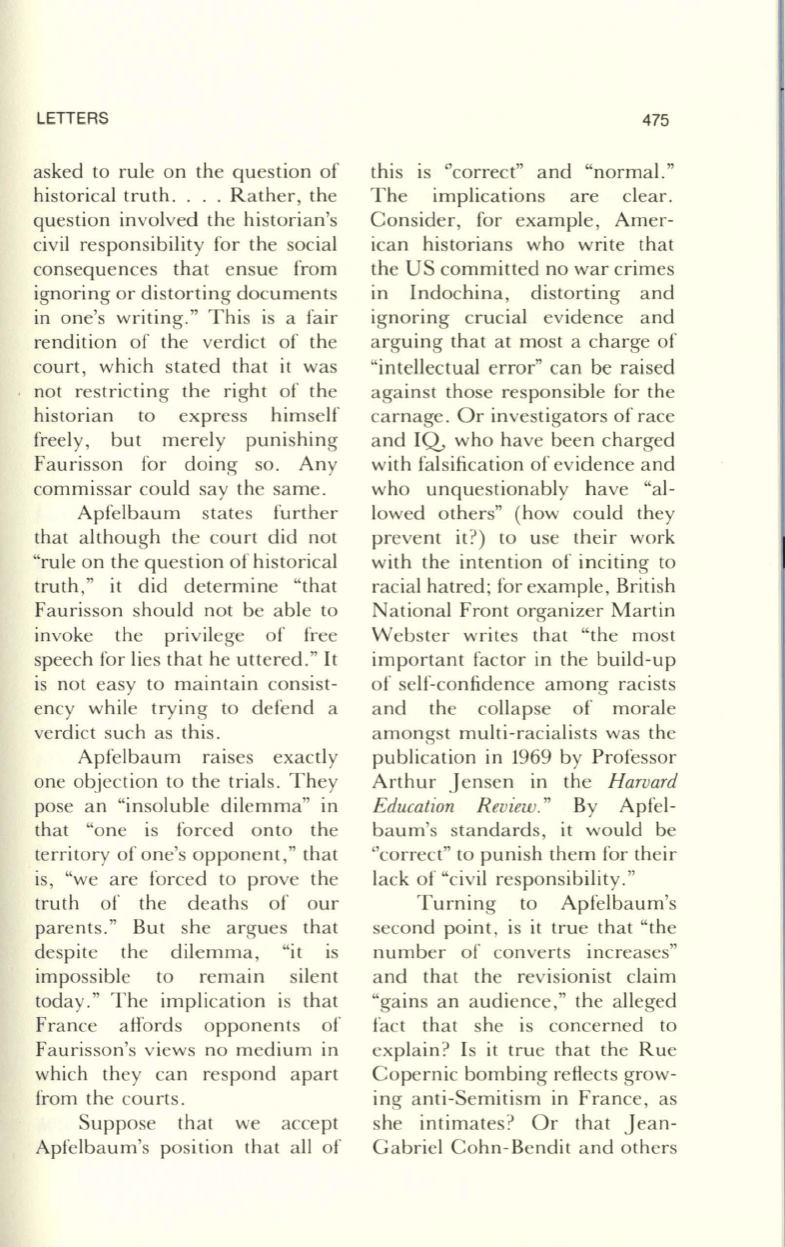
LETTERS
asked to rule on the ques ti on of
hi storical tru th . . . . R a the r , the
question involved the hi stori a n's
civil responsibility fo r the social
consequences that ensue from
ignoring o r di stort ing documents
in one's writing ." This is a fa ir
rendition o f the verdi ct o f the
court , which stated that it was
not restricting the ri ght of the
hi storia n
to
express himself
free ly, but merel y punishing
Fauri sson fo r d oin g so. Any
commissar could say the same.
Apfe lba um sta tes fur ther
tha t although the court d id not
"rule on the ques tion o f hi sto ri cal
tru th ," it did dete rmine "tha t
Fauri sson should not be a ble to
invoke the pri v ilege o f free
speech fo r lies tha t he uttered ." It
is not easy to ma inta in consist–
ency while tryin g to defend a
verdict such as thi s.
Apfe lba um ra ises exac tl y
one objec ti on to the tri als. T hey
pose a n "insolubl e d ilemma" in
tha t "one is fo rced on to the
territory of one's oppone nt ," tha t
is, "we a re fo rced to prove the
truth of the d eaths of our
pa rents." But she a rgues tha t
despite the dilemma, "it
IS
imposs ible to rema in sil ent
today." T he implication is tha t
Fra nce a Ho rds opponents of
Fauri sson's vi ews no med ium in
whi ch they can res pond a pa rt
from the courts.
Suppose that we acce pt
Apfelba um's pos ition tha t a ll of
475
thi s is "correct" a nd "norma l. "
The implicati ons a re clear.
Conside r , for example, Ame r–
ican hi storia ns who wri te tha t
the US committed no war crimes
in Indochina, di storting a nd
igno ring crucial ev ide nce a nd
a rguing tha t a t mos t a charge o f
"intell ec tual error" can be ra ised
against those res ponsible for the
ca rnage. Or investi gators of race
a nd IQ, who have been cha rged
with falsificati on of evidence a nd
who unques tiona bl y ha ve "al–
lowed others" (how could they
prevent it?) to use the ir work
with the inte nti on of inciting to
racial hatred ; for example, British
Na ti onal Front organi zer M a rtin
Webster writes tha t "the most
importa nt fac to r in the build-up
o f self-confidence among rac ists
a nd the coll a pse o f mora le
amongs t multi-rac ia lists was the
publicati on in 1969 by Professo r
Arthur J e nsen in the
Harvard
Education R eview."
By Ap fe l–
ba um's standa rds, it would be
"correc t" to punish them fo r their
lack of "civ il res ponsibility."
T urning to Apfe lba um's
second point , is it true tha t "the
number o f conve rts increases"
a nd tha t the rev isioni st cla im
"gains a n a udi e nce," the alleged
fac t tha t she is conce rned to
ex pla in ? Is it true tha t the Rue
Copernic bombin g reHec ts grow–
ing a nti -Semitism in F ra nce, as
she in tima tes? Or tha t J ean–
Gabriel Cohn-Bend it a nd others


